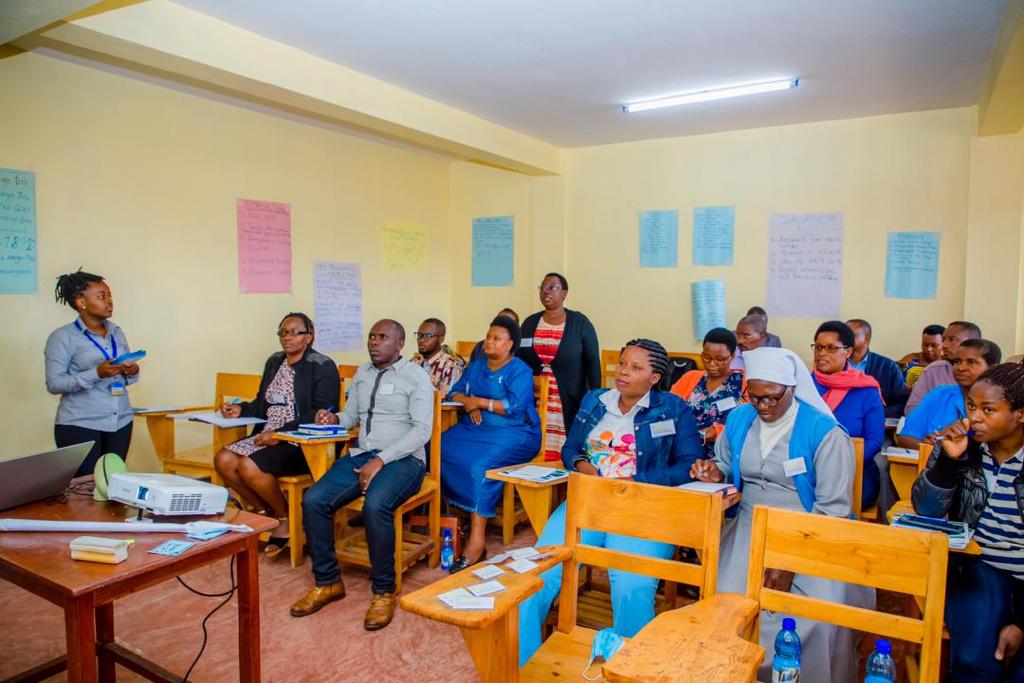Primary school leaders and teachers, who are undergoing the induction training on technology-enabled teaching and pedagogical techniques for enhanced classroom engagement, testified that the skills gained will improve the quality and relevance of learning in public primary schools.
The training is facilitated by Rwanda Basic Education Board (REB) through the Government of Rwanda initiative Rwanda Education Quality Improvement Programme (RwandaEQUIP).
RwandaEQUIP is a programme designed to improve teaching and learning in primary schools, where each student receives the effective, equitable and engaging education they need to reach their full unique potential. The initiative, which is in its second year, targets improved learning outcomes for students by empowering teachers in more than 750 government and government aided schools by 2024.
“Technology enabled transformation of the primary education system is an essential part of realizing Rwanda’s Vision 2050 to becoming a knowledge-based economy” said Hon. Gaspard Twagirayezu, the Minister of State in charge of Primary and Secondary education during his visit to the thousands of trainees.
He recognised the commitment of the school leaders and teachers working together towards improving the quality of education for all learners. He requested them to become champions of this tech-enabled learning which will accelerate learning so that Rwandans are equipped with the right skills to compete globally by 2050.
How it works
According to Marie Merci Twiringiyimana, a RwandaEQUIP trainer, headteachers are equipped with the skills, resources and the technology required to approve efficiency, productivity, and decision-making at their schools.

“We showed them how they can use technology to support teachers to deliver lesson guides efficiently as they transform instruction in their classroom.”
Head teachers are given a smart phone with applications that provide digital insights on what is happening in every classroom; attendance, lesson delivery & learning outcomes in real time.
The teachers are also equipped with teacher guides and classroom management techniques that boost pupil engagement and creativity. These teacher tablets contain well researched and carefully designed daily lesson guides built around the Rwandan curriculum.
The teacher guides help teachers overcome challenges that they used to encounter while designing their lesson plans. Teachers are able to focus more on teaching rather than planning and also deliver lessons in a coherent and easy-to-understand format.
“However, the teachers can only access the detailed teacher guides while they are at school. They are required to sync their teacher guides to the head teacher’s smart device where they mark arrival and departure on a daily basis. After signing arrival at school, the head teacher enables hotspot and shares internet with teachers so they can access and download the lesson guides,” she said.
Josephine Mukashyaka, the Head teacher of G.S Uwinkomo in Nyamagabe district, who is among the trainees said: “previously, the teachers had to sign in books to mark attendance-arrival and departure- but some would skip and others could be absent in classrooms. I can also see when pupils start and finish their lessons, which helps me track their progress,” she said.
Teachers’ reactions to the new teaching methodology
Emmanuel Ngiruwonsanga, a teacher at Ecole Primaire Uwinkingi in Nyamagabe district, is among teachers who were trained and given tablets to improve instruction and class management.
“I have been teaching for 32 years. We used to spend a lot of time preparing lesson plans and writing notes in many exercise books. Sometimes it was difficult to access some teaching materials and this was affecting our performance.
“However, this is going to change after getting the teacher tablets. These tablets contain well developed lesson plans and teaching materials, and we will have more time to support pupils and give time to those who are struggling,” he said.
Chantal Mukanoheri, a teacher at Kiziguro Catholique Primary school in Ngororero district, hailed the training programme explaining that the technology will ease teachers’ work and improve both teachers and learners’ performance.
“Preparing lesson plans and teaching was taking us a lot of time. We would spend a long time looking for teaching materials and sometimes would not get them.
“As a result, we did not have enough time to engage pupils and finish the teaching schedule. Now the tablets with lesson plans and teaching aids will guide us on what to teach on time. This will improve the quality of education,” she said.
She added that the technology-enabled teaching will also improve English speaking skills for both teachers and learners.
“The teaching technique emphasises instruction using English. We have also learned English songs, cheers, energisers that we shall use to motivate pupils and encourage positive behaviour in classrooms,” she noted.
Vestine Uwimana, a teacher at Ecole Primaire de Rushaki in Gicumbi district, said the main challenge she was facing before the training was lack of enough time to prepare notes, assessments, quizzes and teach at the same time.
“The tablet will reduce the time we used to spend on filing a lot of teaching documents while marking teacher and pupil presence in class, and spend it on improving learners’ performance,” she said.
In addition, we have learnt how to encourage positive behaviour and correct pupils’ behaviours.
Alex Nsengimana, a teacher from Nyamagabe district, said that the tech-enabled teaching methodology will also improve pupil’s confidence and speaking skills.
“A pupil would reach primary six without the ability to speak and read effectively. The tech-enabled teaching methodology we were trained on has come as a solution, and if possible, should be scaled up to more schools” he said.
According to Gerard Murasira, the director of teacher training at Rwanda Basic Education Board (REB), 4,500 head teachers and teachers from 150 public primary schools are undergoing training on technology-enabled teaching and effective class management from August 23 to September 23, 2022. The previous training was conducted in January 2022 for 3000 teachers in 100 schools.
Global call for Transformative Education
The teacher training is happening at a time when Governments are currently seeking for evidence-based solutions that will boost learning to recover from unprecedented Covid-19 pandemic-related learning losses due to school closures. At the recently concluded Common wealth Heads of Government Meeting (CHOGM) in Rwanda, heads of states reaffirmed the role of governments in further strengthening education systems to ensure accessible, affordable, high quality and inclusive education for all. Next week, Government leaders across the world will be meeting at the United Nations Transforming Education Summit in New York, to stock of efforts to recover pandemic-related learning losses.
The holistic and highly structured education methodology that the teachers are being trained on through RwandaEQUIP has been endorsed by a Nobel prize winning economist, Prof. Michael Kremer. The study conducted in East African schools by the Nobel Prize winner, confirmed the learning gains in the study are among the largest in the international education literature.
The study suggests that children receive 53 percent more learning over the course of their Early Childhood and primary school career compared to their peers taught using traditional methods.
The study finds that after two years, primary school pupils, through Grade 6, are nearly a whole additional year ahead of pupils taught using traditional methods. For Early Childhood Development (ECD) – typically 3-5-year-old- pupils gain nearly an additional year and half of learning; learning in two years what pupils in other schools learn in three and a half years.
Rwanda is using the methodology in this study to improve teaching and learning through RwandaEQUIP and hopes to see the same results across the country.


